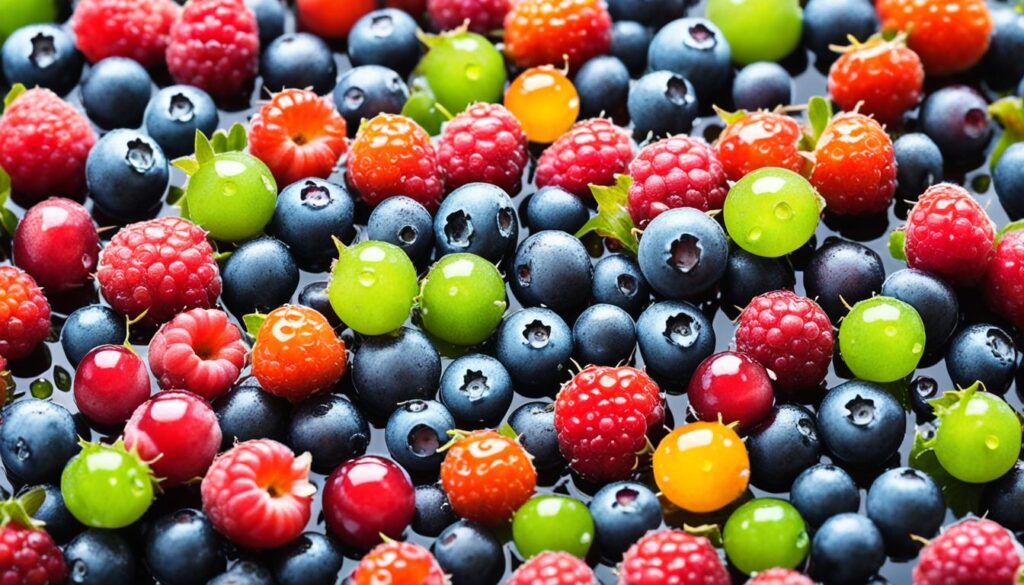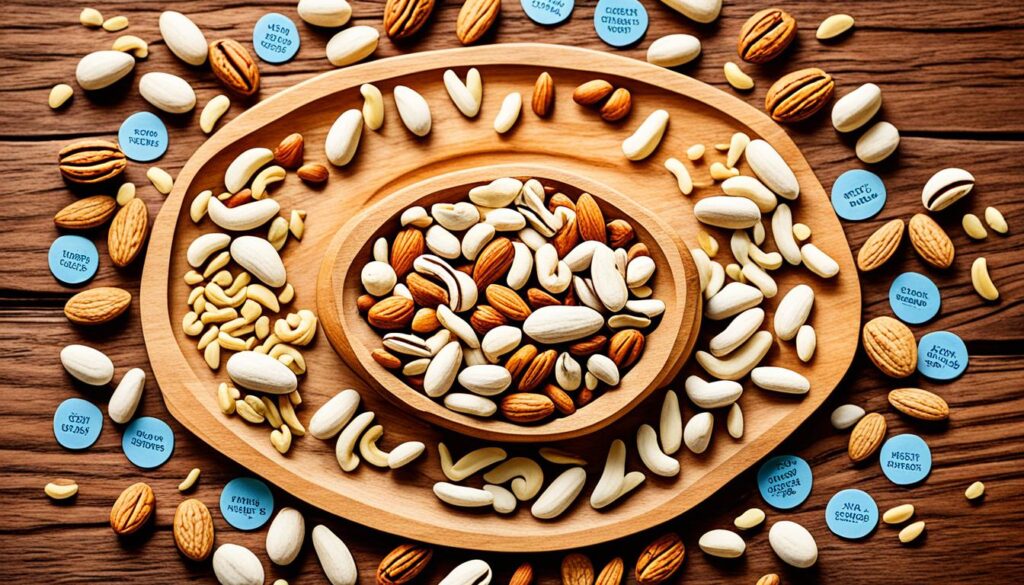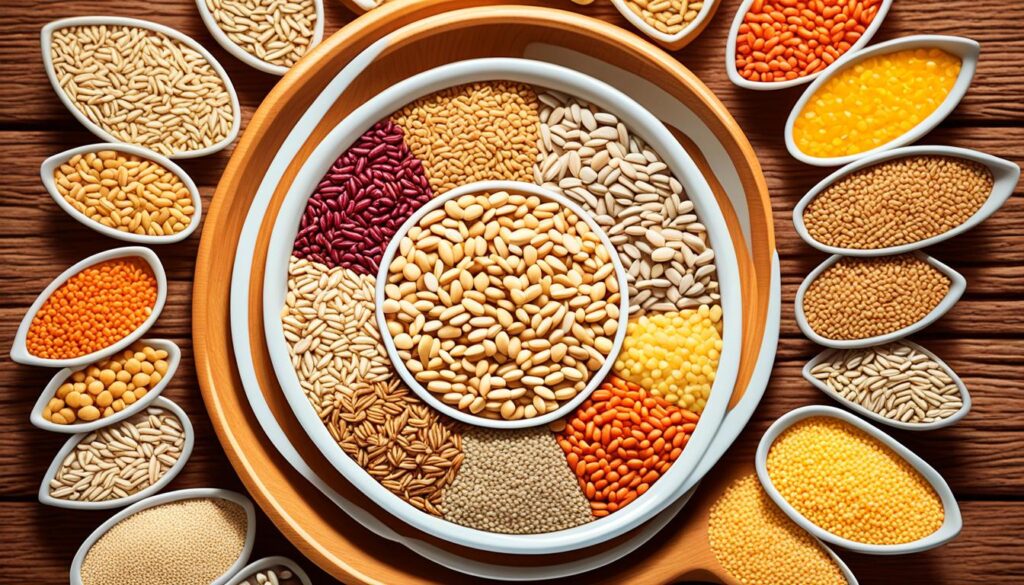Medically reviewed by Dr Chandril Chugh,
Renowned Neurologist and American Trained Specialist
Your brain is a complex organ that requires essential nutrients to function optimally. Incorporating brain-boosting foods into your diet can support both short and long-term brain health. These foods are rich in nutrients like omega-3 fatty acids and antioxidants, which are crucial for building and repairing brain cells, reducing inflammation, and improving blood flow in the brain.
Table of Contents
ToggleIn this article, we will explore the scientific evidence behind 12 of the best brain foods that can naturally boost your brain health. From omega-3-rich oily fish to antioxidant-packed berries, these foods have been shown to enhance brain function and contribute to overall well-being.
Key Takeaways:
- Incorporating brain-boosting foods into your diet can support both short and long-term brain health.
- These foods are rich in nutrients like omega-3 fatty acids and antioxidants, which are crucial for building and repairing brain cells, reducing inflammation, and improving blood flow in the brain.
- Oily fish, such as salmon, mackerel, and sardines, are excellent sources of omega-3 fatty acids, which help improve brain function.
- Dark chocolate with at least 70% cacao can improve brain function and provide other brain-related benefits.
- Berries, including strawberries and blueberries, are rich in antioxidants that improve brain communication and memory.
- Nuts and seeds, like walnuts and flaxseeds, are high in omega-3 fatty acids and antioxidants, supporting brain development and function.
1. Oily Fish for Brain Health
When it comes to promoting brain health, incorporating oily fish into your diet can provide significant benefits. Oily fish such as salmon, mackerel, tuna, herring, and sardines are exceptionally rich sources of omega-3 fatty acids, a type of polyunsaturated fat known for its positive impact on brain function.
Omega-3 fatty acids play a crucial role in building and repairing brain cells, as well as improving the structure of neurons. Research has shown that individuals with high levels of omega-3s tend to have increased blood flow in the brain, leading to enhanced cognitive abilities.
In addition to oily fish, other sources of omega-3s include soybeans, nuts, flaxseed, and other seeds. Incorporating these foods into your diet can help ensure an adequate intake of these essential fatty acids, promoting optimal brain health and function.
Consider the following table for a comparison of omega-3 levels in different types of oily fish:
| Fish | Omega-3 Fatty Acid Content (per 100g) |
|---|---|
| Salmon | 2.2g |
| Mackerel | 2.6g |
| Tuna | 1.0g |
| Herring | 2.7g |
| Sardines | 1.5g |
Include oily fish regularly in your meals to harness the benefits of omega-3 fatty acids for brain health. Whether you enjoy grilled salmon, a flavorful tuna salad, or sardines on toast, these delicious options can nourish your brain and support optimal cognitive function.

Supporting brain health with omega-3 fatty acids
Omega-3 fatty acids found in oily fish help build and repair brain cells, improving cognitive function and blood flow in the brain.
- Rich sources of omega-3s include salmon, mackerel, tuna, herring, and sardines.
- Including soybeans, nuts, flaxseed, and other seeds in your diet can also provide omega-3 fatty acids.
- A comparison of omega-3 levels in different types of oily fish is shown in the table above.
2. Dark Chocolate for Brain Health
When it comes to indulging your sweet tooth, you’ll be pleased to know that dark chocolate can actually be good for your brain. Dark chocolate contains flavonoids, powerful antioxidants that play a key role in brain health. These flavonoids are particularly abundant in cocoa, the primary ingredient in dark chocolate.
Research has shown that the flavonoids in dark chocolate can have a positive impact on brain plasticity. Brain plasticity refers to the brain’s ability to change and reorganize itself throughout life, which is crucial for learning, memory, and cognitive function.
Flavonoids in dark chocolate have been found to promote neuron and blood vessel growth in the brain, leading to increased blood flow and improved oxygenation. This boost in blood flow and oxygen supply can enhance brain plasticity and support overall brain function.
But not all chocolate is created equal. It’s important to choose dark chocolate with a high cocoa content, preferably at least 70%. This ensures a higher concentration of flavonoids and antioxidants, maximizing the potential brain benefits.
Studies have shown that consuming dark chocolate with high cocoa content can improve brain function and provide a range of other brain-related benefits. So go ahead and savor a piece of dark chocolate guilt-free, knowing that you’re not only satisfying your taste buds but also supporting your brain health.
| Benefits of Dark Chocolate for Brain Health |
|---|
| Improved brain plasticity |
| Increased blood flow to the brain |
| Enhanced oxygenation |
| Support for overall brain function |
3. Berries for Brain Health
Berries are not only delicious but also incredibly beneficial for your brain. Whether you prefer strawberries, blackberries, blueberries, blackcurrants, or mulberries, incorporating these antioxidant-rich fruits into your diet can work wonders for your cognitive function.
The antioxidants found in berries, such as anthocyanin, caffeic acid, catechin, and quercetin, play a crucial role in promoting brain health. These powerful compounds have been shown to reduce inflammation, improve communication between brain cells, and enhance brain plasticity.
One of the key benefits of antioxidants is their ability to combat oxidative stress and protect brain cells from damage caused by free radicals. This protection not only helps to preserve memory and cognitive function but also reduces the risk of age-related neurodegenerative diseases and cognitive decline.
Furthermore, berries have been found to improve brain communication, helping different regions of the brain work together more efficiently. This enhanced communication can enhance memory, focus, and overall cognitive performance.
To reap the most benefits, try to incorporate a variety of berries into your diet on a regular basis. You can enjoy them fresh, add them to smoothies, sprinkle them on salads, or include them in your morning cereal. Remember, the more colorful your diet, the more diverse the range of antioxidants you’re consuming.
So why not start your day with a bowl of antioxidant-rich berries and give your brain the boost it deserves?

| Berry | Antioxidants |
|---|---|
| Strawberries | Anthocyanin, Caffeic Acid, Quercetin |
| Blueberries | Anthocyanin, Catechin, Quercetin |
| Blackberries | Anthocyanin, Catechin, Quercetin |
| Blackcurrants | Anthocyanin, Caffeic Acid, Quercetin |
| Mulberries | Anthocyanin, Caffeic Acid |
4. Nuts and Seeds for Brain Health
When it comes to boosting brain health, nuts and seeds are small but mighty powerhouses. Packed with essential nutrients like omega-3 fatty acids and antioxidants, these versatile foods provide numerous benefits for brain function and overall well-being.
Walnuts, almonds, sunflower seeds, and pumpkin seeds are excellent choices for incorporating omega-3 fatty acids into your diet. Omega-3s play a vital role in brain development, enhance cognitive function, and protect against oxidative stress.
In addition to omega-3 fatty acids, nuts and seeds are rich in antioxidants. These powerful compounds help combat inflammation, which can negatively impact brain health. Antioxidants also protect brain cells from damage and promote optimal brain function.
Notably, research suggests that a higher intake of nuts is associated with better brain function in older adults. Vitamin E, which is found abundantly in nuts and seeds, has been linked to improved cognition and a reduced risk of Alzheimer’s disease.
To reap the benefits, incorporate a variety of nuts and seeds into your diet. You can enjoy them as a convenient and nutritious snack, sprinkle them over salads or yogurt, or use them as ingredients in homemade granola bars or trail mix.

When it comes to nourishing your brain, nuts and seeds are an excellent choice. Their combination of omega-3 fatty acids, antioxidants, and other essential nutrients supports brain function, enhances cognitive abilities, and protects against age-related cognitive decline.
Next, we’ll explore the benefits of whole grains for brain health. Stay tuned!
5. Whole Grains for Brain Health
Including whole grains in your diet is not only beneficial for your overall health but also promotes brain function. Whole grains such as brown rice, barley, bulgur wheat, oatmeal, whole-grain bread, and whole-grain pasta are packed with essential nutrients that support your brain.
Fiber is a key component of whole grains and plays a crucial role in brain health. It helps improve concentration and memory, ensuring that your brain stays sharp and focused. By providing a steady release of energy, fiber also helps regulate blood sugar levels, preventing energy crashes and brain fog.
Vitamin E, another vital nutrient found in whole grains, acts as a powerful antioxidant that protects your brain cells from oxidative stress. This protection contributes to improved cognition and reduces the risk of age-related cognitive decline.

Additionally, whole grains are excellent sources of complex carbohydrates, omega-3 fatty acids, and B vitamins. These nutrients work together to support normal brain function, enhance neurotransmitter production, and promote healthy brain cells.
The Benefits of Whole Grains for Brain Health:
- Improved concentration and memory
- Protection against oxidative stress
- Enhanced neurotransmitter production
- Promotion of healthy brain cells
| Whole Grains | Fiber Content (per 100g) | Vitamin E Content (per 100g) |
|---|---|---|
| Brown Rice | 3.5g | 0.8mg |
| Barley | 14.5g | 0.6mg |
| Bulgur Wheat | 18.3g | 0.4mg |
| Oatmeal | 10.6g | 0.5mg |
| Whole-Grain Bread | 6.9g | 0.4mg |
| Whole-Grain Pasta | 6g | 0.6mg |
6. Coffee for Brain Health
When it comes to boosting your brain health, coffee can be a valuable ally. Filled with caffeine, coffee provides an array of benefits for your brain.
Caffeine, found in coffee, blocks adenosine in the brain, which helps increase alertness and improve brain entropy. This means that coffee can help sharpen your focus and enhance cognitive performance.
But coffee doesn’t stop there. It also doubles as an antioxidant, which means it can protect your brain cells from damage caused by free radicals. As you age, this becomes especially important as antioxidants can support brain health and protect against neurodegenerative diseases.
A lifelong habit of consuming coffee has even been associated with a reduced risk of stroke and age-related neurological disorders, including conditions like Alzheimer’s and Parkinson’s disease.
However, it’s important to note that while coffee can offer these brain-boosting benefits, it’s also worth considering the potential effects of caffeine on your sleep. Depending on your sensitivity to caffeine, consuming coffee late in the day could disrupt your sleep patterns, which may negatively impact your overall brain function.
Benefits of Coffee for Brain Health:
- Increased alertness and focus due to blocking adenosine
- Improved brain entropy, enhancing cognitive performance
- Antioxidant protection for brain cells
- Reduced risk of stroke
- Protective effects against age-related neurodegenerative diseases
| Coffee and Brain Health | Benefits |
|---|---|
| Increased alertness and focus | Due to blocking adenosine |
| Improved brain entropy | Enhancing cognitive performance |
| Antioxidant protection | For brain cells |
| Reduced risk of stroke | |
| Protective effects | Against age-related neurodegenerative diseases |
7. Avocados for Brain Health
Avocados are a delicious and nutritious addition to your diet that can benefit your brain health. They are packed with monounsaturated fats, which are considered healthy fats that have been shown to reduce blood pressure and promote cardiovascular health. By incorporating avocados into your meals, you can support brain function and lower the risk of cognitive decline.
In addition to their monounsaturated fat content, avocados are also a good source of omega fatty acids and vitamin E. Omega fatty acids are essential for brain development and function, as they help maintain the integrity of cell membranes and support communication between brain cells. Vitamin E, on the other hand, is a powerful antioxidant that protects against oxidative stress and may enhance cognitive performance.
Other sources of healthful unsaturated fats include almonds, cashews, peanuts, flaxseed, chia seeds, and various oils. These can be incorporated into your diet alongside avocados to further support brain health.
To reap the benefits of avocados for brain health, try adding slices of avocado to your salads, sandwiches, or wraps. You can also enjoy it as a spread on toast or as a dip for raw vegetables. The creamy texture and mild flavor of avocados make them a versatile and satisfying addition to any meal.
Avocado Nutritional Information
| Nutrient | Amount per 100g |
|---|---|
| Energy | 160 calories |
| Total Fat | 14.66g |
| Saturated Fat | 2.13g |
| Monounsaturated Fat | 9.80g |
| Polyunsaturated Fat | 1.82g |
| Omega-3 Fatty Acids | 160mg |
| Omega-6 Fatty Acids | 1320mg |
| Carbohydrate | 8.53g |
| Fiber | 6.7g |
| Protein | 2g |
| Vitamin E | 2.07mg |
8. Peanuts for Brain Health
Peanuts are not only a tasty snack but also a great choice for supporting brain health. These small legumes pack a nutritional punch, containing plenty of unsaturated fats, protein, vitamin E, and resveratrol.
Vitamin E, found abundantly in peanuts, is an antioxidant that plays a crucial role in protecting cells from damage. It has been linked to potential protective effects against neurological diseases like Alzheimer’s and Parkinson’s, which can negatively impact brain health.
Resveratrol, another powerful antioxidant found in peanuts, has been shown in some studies to have potential neuroprotective properties. It may help protect brain cells from oxidative stress and inflammation, both of which can contribute to cognitive decline.
When it comes to brain health, the nutritional profile of peanuts is certainly impressive. Not only do they provide healthy unsaturated fats, crucial for brain function, but they also offer a good source of protein, which supports brain health and helps maintain energy levels.
To reap the benefits of peanuts for brain health, enjoy them as a snack on their own or incorporate them into your diet in other ways. Add them to salads, stir-fries, or use them as a peanut butter spread on whole-grain toast for a nutritious and brain-boosting snack.
Conclusion
Eating a brain-boosting diet is essential for promoting brain health and overall well-being. By incorporating foods rich in antioxidants, B vitamins, healthful fats, and omega fatty acids into your diet, you can enhance memory, concentration, and the overall function of your brain. These brain-boosting foods may also help reduce the risk of stroke and age-related neurodegenerative diseases, safeguarding your long-term brain health.
However, optimizing brain function goes beyond just diet. It is important to prioritize other lifestyle factors as well. Getting enough sleep, staying hydrated, exercising regularly, reducing stress levels, and moderating alcohol intake all contribute to a healthy brain. By adopting these habits, you can further support your brain’s performance and well-being.
Remember, the key to maintaining a healthy brain is consistency. By consistently following a brain-boosting diet and incorporating healthy lifestyle habits, you can not only improve brain health but also enhance your overall well-being. Take care of your brain, and it will take care of you.
FAQ
How can I boost my brain health?
There are several foods that naturally boost brain health. Including foods rich in omega-3 fatty acids, antioxidants, B vitamins, and healthful fats in your diet can improve memory, concentration, and overall brain function. Additionally, maintaining a healthy lifestyle by getting enough sleep, staying hydrated, exercising regularly, reducing stress, and minimizing alcohol intake can optimize brain health.
Which foods are considered brain-boosting?
Foods that are considered brain-boosting include oily fish rich in omega-3 fatty acids (such as salmon, mackerel, tuna, herring, and sardines), dark chocolate with at least 70% cacao, berries (such as strawberries, blackberries, blueberries, blackcurrants, and mulberries), nuts and seeds (like walnuts, almonds, sunflower seeds, and pumpkin seeds), whole grains (such as brown rice, barley, bulgur wheat, oatmeal, whole-grain bread, and whole-grain pasta), coffee, avocados, and peanuts.
How do omega-3 fatty acids benefit the brain?
Omega-3 fatty acids help build and repair brain cells, improve the structure of neurons, and enhance brain function. Research has shown that higher levels of omega-3s are associated with increased blood flow in the brain, better cognition, and reduced risk of age-related neurodegenerative diseases. Oily fish, soybeans, nuts, and seeds are good sources of omega-3 fatty acids.
What are the brain-boosting properties of dark chocolate?
Dark chocolate contains flavonoids, antioxidants that are important for brain health. Flavonoids in dark chocolate may encourage neuron and blood vessel growth in the brain, stimulate blood flow, and improve brain plasticity. Studies have shown that dark chocolate with at least 70% cacao can improve brain function and provide other brain-related benefits.
How do berries contribute to brain health?
Berries are rich in antioxidants like anthocyanin, caffeic acid, catechin, and quercetin. These antioxidants reduce inflammation, improve communication between brain cells, increase plasticity, and reduce the risk of age-related neurodegenerative diseases and cognitive decline. Including berries like strawberries, blackberries, blueberries, blackcurrants, and mulberries in your diet can support brain health.
What role do nuts and seeds play in brain health?
Nuts and seeds are high in omega-3 fatty acids and antioxidants, which support brain development, enhance brain function, and protect against oxidative stress. Research has shown that a higher overall intake of nuts is linked to better brain function in older age. Additionally, vitamin E found in nuts and seeds may contribute to improved cognition and reduced risk of Alzheimer’s disease.
How do whole grains support brain function?
Whole grains are a good source of fiber and vitamin E, which are beneficial for brain function. Fiber helps with concentration and memory, while vitamin E protects cells from oxidative stress and contributes to improved cognition. Including whole grains like brown rice, barley, bulgur wheat, oatmeal, whole-grain bread, and whole-grain pasta in your diet can support normal brain function.
What are the brain-related effects of consuming coffee?
Coffee contains caffeine, which blocks adenosine in the brain and increases alertness and brain entropy. Caffeine also acts as an antioxidant and may support brain health as a person gets older. Lifelong coffee consumption has been linked to a reduced risk of stroke and age-related neurodegenerative diseases. However, it’s important to consider the potential effects of caffeine on sleep.
How can avocados benefit brain health?
Avocados are rich in monounsaturated fats, which can help reduce blood pressure and lower the risk of cognitive decline. They are also a good source of omega fatty acids and vitamin E, both of which support brain development and protect cell membranes. Including avocados in your diet can contribute to overall brain health.
What are the brain-boosting properties of peanuts?
Peanuts contain unsaturated fats, protein, vitamin E, and resveratrol. Vitamin E and resveratrol are antioxidants that protect against cellular damage and have potential protective effects against neurological diseases like Alzheimer’s and Parkinson’s. Incorporating peanuts into your diet can help maintain energy levels and support brain health.
